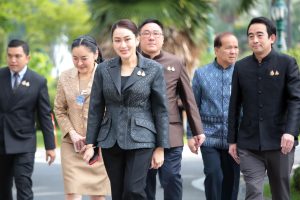Amidst a multidimensional national crisis and a political landscape ridden with division, Thailand’s new prime minister, Paetongtarn Shinawatra, is taking the reins of power at a critical moment. Less than a month into her premiership, she is being confronted with severe flooding that has displaced thousands and wrought havoc on the country’s infrastructure. In addition to the literal storms, Thailand faces political storms fomented from the country’s long strained relationship with democracy and human rights.
Paetongtarn Shinawatra’s last name should sound familiar to anyone with even a passing knowledge of Thai politics. As the daughter of former prime minister Thaksin Shinawatra, her political lineage provides both challenges and opportunities. Like her father, she will be distrusted by the royalist establishment but can count on significant popular support for any proposed reforms. Her rise to the top comes amidst bombshell decisions by the Constitutional Court to dissolve the political party with the largest voting bloc in the parliament and to remove Prime Minister Srettha Thavisin and his cabinet from office. These rulings left domestic and international observers aghast and questioning Thailand’s political trajectory.
While the politically inexperienced Paetongtarn may be able to consolidate political power and steady the ship momentarily, the question constantly lingering over her administration is: What future does Thailand want and need?
In the coming months, Paetongtarn will have key opportunities to lay out her vision regarding Thailand’s future, including the assessment of Thailand’s candidacy for a seat on the Human Rights Council, voting for which is scheduled to take place on Wednesday. This comes at a critical time, as Thailand’s human rights record is under heavy scrutiny both domestically and internationally. The recent Constitutional Court rulings have cast doubt on the country’s commitment to democratic principles, the balance of power between elected and appointed bodies, and its adherence to international human rights standards, such as freedom of speech and political participation.
For other nations to take Thailand’s Human Rights Council candidacy seriously, Prime Minister Paetongtarn must urgently commit to serious reforms. If the new prime minister is serious about championing human rights, as pledged in the “#Thailand4HRC” campaign, she must address judicial overreach and the political suppression that has defined the country’s recent past. Taming the Constitutional Court, whose unchecked authority has repeatedly undermined democracy, would be a good place to start. Reforming this power imbalance would restore trust in Thailand’s electoral process and safeguard political pluralism, signaling her government’s commitment to human rights on the global stage.
Internationally, Thailand must take a more proactive, rights-focused approach to the crisis in Myanmar. Thailand’s well-publicized commitment to “coordinating efforts to establish peace and stability” in war-ravaged Myanmar rings hollow in light of a recent report by the U.N. Special Rapporteur for the Situation of Human Rights in Myanmar. According to the report, in the year ending in March 2024, Thailand exported $130 million in weapons and military supplies to Myanmar – double the amount of the year before. Thai banks were also found to have facilitated financial transactions in the hundreds of millions for the Myanmar junta’s military, effectively financing weapon and fuel purchases for a military that is committing genocide, war crimes, and crimes against humanity.
The fact that the prime minister’s recent policy statement to parliament made no mention of either Myanmar or human rights was a missed opportunity. The government can and should address these oversights by fully committing to democratic reforms at home and by cutting the flow of arms and cash that’s fueling the Myanmar junta’s deadly carnage.
Despite being only weeks into her new job, Prime Minister Paetongtarn is not short of critics. But, in many ways, her leadership can represent a turning point for Thailand: she is young, well-educated, and has a strong support base, especially among the young. If she can successfully address both the immediate crises and the long-term political reforms Thailand needs, she can put Thailand on the path to a brighter future. However, if her administration continues on the path of implicitly supporting political repression at home while funding atrocities abroad, the consequences will be dire – not just for her administration but for Thailand’s international standing in the long term.
The floods won’t last forever, but the political and human rights challenges facing Thailand will persist long after the waters subside. The new prime minister’s approach to these complex, intertwined issues will define her leadership. At this juncture, Thailand cannot afford to ignore its human rights obligations nor the cries of its citizens battered by floods and political turbulence. Likewise, Thailand can provide international leadership on the Myanmar crisis, but it must first stop with its snake-tongued diplomacy and backhanded deals with the junta.
Can Paetongtarn rise to the occasion? Or will she, like the country itself, be swept away by the flood of crises engulfing Thailand? The coming months will tell.

































